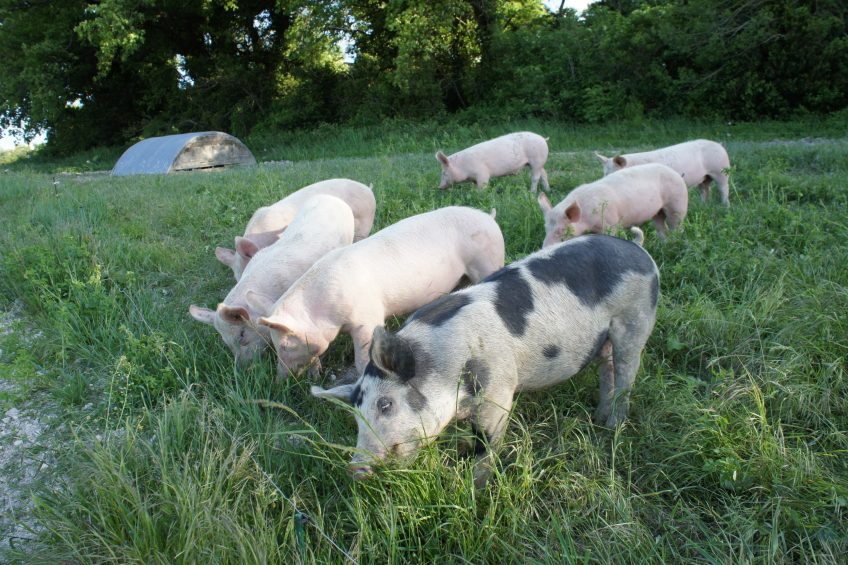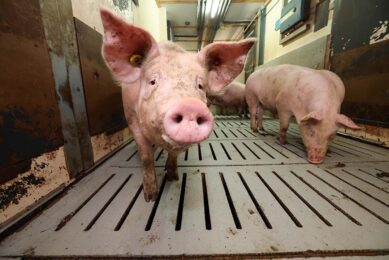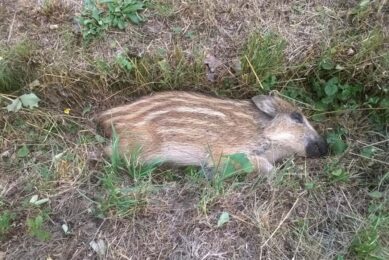3 steps France is taking to improve organic pig feed

Since 2010, several institutes have carried out a lot of research on how to meet European legislation requirements which is asking for organic pigs to be fed with organic feed only, as of 1 January 2018.
Institutes participating in these initiatives are e.g. the French Pork and Pig Institute (IFIP), the French Organic Agriculture Institute (ITAB), and the Chamber of Agriculture of Pays de Loire.
Postponing deadlines for organic feed
Technical issues, however, have been so complex that the legislation may be postponed again. A first deadline of this legislation was 1 January 2015.
To have monogastric diets switch to 100% organic, several issues arise: balance of diets, availability of raw materials which are rich in proteins, environmental impacts (more nitrogenous waste) and economic impacts (more expensive feeds or lower animals performances).
Diversifying protein sources
Several research projects have been conducted to give answers to these issues at regional, national and European levels:

ProtéAB project (Nov 2010-March 2014)
How to develop grain legumes in organic agriculture to secure animal production and diversify crop systems? Co-ordinated by Inter Bio Bretagne (IBB), this project made it possible to quantify the French protein deficit in organic farming (which passes from 12,000 tonnes of total protein* in 2012 to 18,000 tonnes in 2015), started a network of 120 experimental fields to evaluate varieties of peas, horse beans and lupine and carried out numerous nutritional analyses of these raw materials. This project led to the conclusion that peas, horse beans and lupins were best grown combined with cereals.

European ICOPP project (2011-2014)
This project, an acronym for the ‘Improved contribution of local feed to support 100% of organic feed supply to pigs and poultry’ was co-ordinated by the University of Aarhus in Denmark. In total, 7 countries participated in it; the project was aimed at exploring economical viable feeding strategies based on 100% organic feed across Europe.
Through a co-operation between 11 partners, a range of feeding experiments were carried out with pigs (sows, piglets and finishers) and poultry (layers and broilers) focusing on concentrate feedstuffs, roughage, and foraging from the range.
In addition, 3 cross-cutting activities supported the overall interpretation; these worked on the availability of relevant feeds across Europe, comparable information on feeding values of new feed stuffs (of which algae, insect larvae) for practical planning, and economic and environmental assessment of new strategies.

Secalibio project (2016-2019)
Collective synthesis of previous projects (managed by ITAB, IBB and the Chamber of Agriculture of Pays de Loire), Secalibio aims to to build references to produce original crops rich in proteins such as nettle or sesame, in order to secure the feed systems of organic monogastric productions (pigs and poultry).
The goal of Sécalibio is also to write a reference guide to produce proteic crops in association with cereals. Soya is also a part of this project, with the idea to find new areas to grow this crop and to find the best varieties without irrigation.
Zootechnical trials will also create technical references on the management of sows on rotating meadows (measures are being done on the experimental Trinottières farm in Pays de Loire in order to reduce feed costs).
More information on all researchers can be found on a specific monogastric nutrition website, entirely in French.
* Measured in ‘Matières Azotées Totales’ (MAT).
Join 18,000+ subscribers
Subscribe to our newsletter to stay updated about all the need-to-know content in the pigsector, three times a week. Beheer
Beheer










 WP Admin
WP Admin  Bewerk bericht
Bewerk bericht